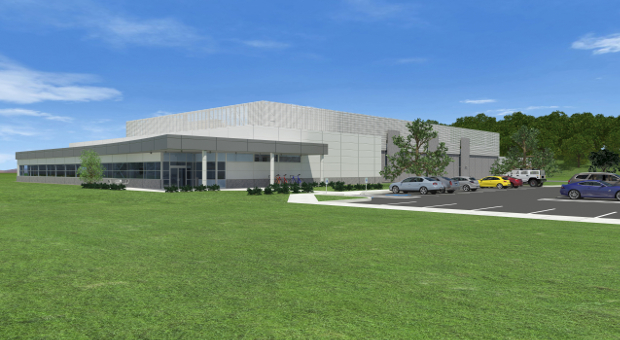Campus breaks ground on University Technology Center

Officials from Penn State Health Milton S. Hershey Medical Center today held a ceremonial groundbreaking for a 46,000-square-foot, $54-million data center on the Medical Center and College of Medicine campus. The construction of the University Technology Center is the next step to enabling Penn State College of Medicine to utilize “big data” to enhance patient care through disease modeling and predictors for disease by more efficiently processing and analyzing clinical information.
The new center will provide centralized space and enhanced security for patient, research and educational data for the Medical Center and College of Medicine, as well as powerful computers and main frames for analyzing the information.
“Building this new data center is every bit as crucial for improving the health outcomes of people in central Pennsylvania as building a new hospital or institute,” said Dr. A. Craig Hillemeier, chief executive officer, Penn State Health Milton S. Hershey Medical Center, Penn State's senior vice president for health affairs and dean, Penn State College of Medicine. “Two of the biggest factors in modern health care are personalized medicine and population health, and the common denominator with both is the ability to gather and analyze large volumes of rich health data.”
>> Note to editors: Photos of the groundbreaking and a digital rendering of the new data center are available here, and a video walk-through of the building is available at http://vimeo.com/116674020.
The data center will complement the work of researchers within Penn State Institute for Personalized Medicine, which manages a bio-repository of patient samples such as blood and saliva from Penn State Hershey clinics and other providers. The Institute then utilizes genomic resources with high-end tools for genetic testing and analysis of these patient samples and finally, the samples are prepared for geno-sequencing. The center will enhance these efforts to make personalized medicine more of a reality for patients and their providers by making it possible to analyze in minutes or hours what would take scientists and doctors days, weeks or months to do right now.
The center also will allow doctors and others to use clinical data to identify populations of patients at risk for specific diseases, such as diabetes or stroke, to help those patients better manage their health issues and, in many cases, reduce bad health outcomes. This population health approach is good for patients, but also important for health systems, which will soon be reimbursed more for the quality of the care they provide and for their ability to reduce costs through prevention and disease management.
In addition, the data center will serve an integral role in the University's disaster recovery plan as the back-up location for Penn State's primary data center. Likewise, the University Park data facility will serve as a backup for Hershey's data center. The portion of the Hershey center dedicated to supporting disaster recovery needs at Penn State is separate from the research and analysis of clinical information.
“As Penn State Health continues to expand technology to provide the best education, research, patient care and community service possible, the demands for data center capacity, collaboration and security have increased significantly,” said Rodney Dykehouse, chief information officer, Penn State Health Milton S. Hershey Medical Center. “This data center puts Penn State on par with the most cutting-edge health care organizations in the nation in terms of redundancies that ensure disaster recovery capabilities, energy efficiency and the ability to support future growth and data needs.”
The center will feature various energy-saving components to eliminate waste and improve efficiency. For instance, measures incorporated into the center's design are expected to result in using at least 60 percent less power for critical systems than typical data centers. To further enhance these efficient operations, the data center will be Leadership in Energy and Environmental Design (LEED)-certified. The center will be constructed to a Tier III resiliency for critical infrastructure in order to maintain a high level of operational reliability and protection of data systems.
The one-story data center will encourage collaboration among approximately 100 researchers and health information technology professionals in an atmosphere of open concept office areas. Construction of the data center, which will be located on land near the intersection of Life Lion Drive and Bullfrog Valley Road, will begin following final approval of plans by the Derry Township Board of Supervisors. The data center is expected to open in April 2016.
If you're having trouble accessing this content, or would like it in another format, please email Penn State Health Marketing & Communications.
